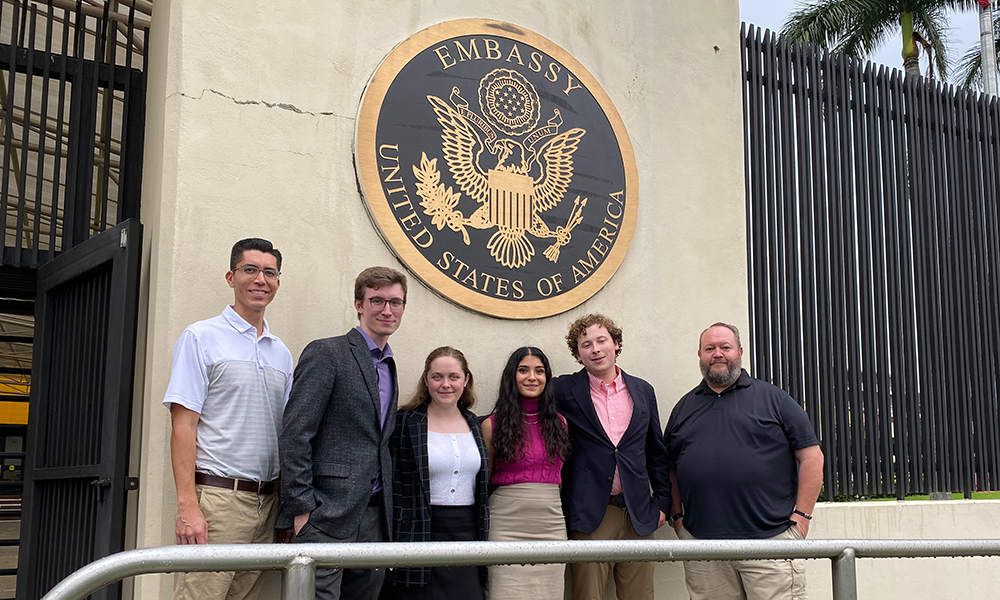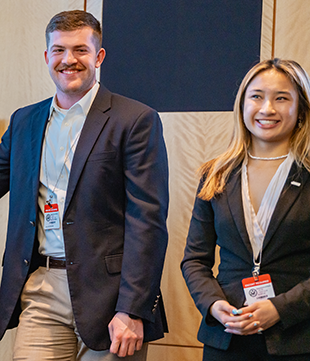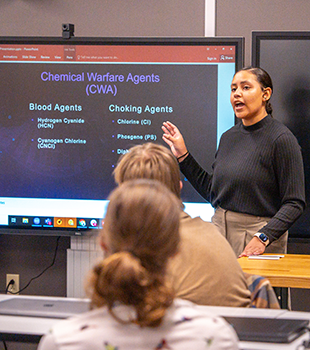Tackling global diplomacy
News
SUMMARY: The College of Arts and Letters Diplomacy & Defense Lab, under the leadership of Bernie Kaussler, professor of political science, is giving students the chance to tackle real-world problems and propose solutions in Washington, D.C. and even abroad at the U.S. Embassy in Costa Rica.
The new College of Arts and Letters Diplomacy & Defense Lab, under the leadership of Bernie Kaussler, professor of political science, enables students to apply classroom learning to real-world problems. The lab partners with donors and government agencies, such as the U.S. Department of State, to support student learning and professional development. It also opens opportunities for faculty research and collaboration with government agencies.
Kaussler began this kind of work in 2017, team-teaching JMU’s Hacking for Diplomacy and Hacking for Defense courses. Stanford University originally designed the innovative courses to connect graduate students with U.S. government and armed-forces work. JMU is the first university to offer them at the undergraduate level. Teams of students from across campus respond to real foreign-policy and national-security challenges by conducting in-depth research, interviewing professionals from a variety of disciplines and sectors and using design methods to prototype solutions that they test and revise throughout the semester.
 “Coming in as undergraduate students, it was absolutely intimidating, yet we consistently found our ideas respected and valued,” shared Ai Vy Le (‘25). “Our sponsors not only collaborated with us but also implemented our suggestions in real time, fostering a genuine, professional, collective effort. This experience honed my professional skills and boosted my confidence.”
“Coming in as undergraduate students, it was absolutely intimidating, yet we consistently found our ideas respected and valued,” shared Ai Vy Le (‘25). “Our sponsors not only collaborated with us but also implemented our suggestions in real time, fostering a genuine, professional, collective effort. This experience honed my professional skills and boosted my confidence.”
In November 2023, two Hacking teams travelled to San José, Costa Rica to conduct research on security challenges at U.S. embassies. With invitations from the U.S. Department of State and generous funding from the Common Mission Project and the global advisory company BMNT, four JMU students conducted field work on embassy security. They talked through their ideas with Marines and other diplomatic security staff and then refined their proposals based on what they were learning on the ground. Following their trip, Mike Flores, Deputy Chief of Mission of the U.S. Mission to Costa Rica, reflected: “I was so impressed by the group of students who visited Costa Rica last week. They are bright, energetic, and have a high level of emotional intelligence. These students reaffirm my confidence in the future of our institution and the country.” Mike Flores traveled all the way from Costa Rica to Washington, D.C., to attend the end-of-semester final presentations.
To increase access to these learning opportunities, Kaussler worked with the Office for Global Partnerships at the U.S. Department of State to become part of the Diplomacy Lab network in 2023. Through its Diplomacy Lab, the U.S. Department of State “course-sources” foreign affairs-related research by leveraging the expertise and enthusiasm of students and faculty from universities nationwide. The State Department benefits from working with students in a range of disciplines and those students contribute directly to foreign policymaking.
 Kaussler integrated several projects into his Fall 2023 senior seminar course to address a range of problems, including helping the U.S. Embassy in Kathmandu reach Americans during emergencies, presenting a report to Congress on Chinese intimidation and censorship efforts, and developing a cyberwarfare curriculum for the Foreign Service Institute. For Fall 2024, faculty in philosophy and religion, communication studies and political science successfully bid to lead projects that involve measuring China’s influence in Central Europe, protecting environmental defenders from violence, examining electoral systems in the Americas and advancing mental health support in developing countries.
Kaussler integrated several projects into his Fall 2023 senior seminar course to address a range of problems, including helping the U.S. Embassy in Kathmandu reach Americans during emergencies, presenting a report to Congress on Chinese intimidation and censorship efforts, and developing a cyberwarfare curriculum for the Foreign Service Institute. For Fall 2024, faculty in philosophy and religion, communication studies and political science successfully bid to lead projects that involve measuring China’s influence in Central Europe, protecting environmental defenders from violence, examining electoral systems in the Americas and advancing mental health support in developing countries.
With a gift from a Virginia-based foundation, the CAL Diplomacy & Defense Lab has extended its work to local high school students by hosting the inaugural Madison Diplomacy Challenge in May 2024. Thirty-five students from Harrisonburg High School participated in a crisis simulation in which they represented various countries and engaged in diplomatic negotiations. Through such experiences, students develop strategic thinking, conflict resolution and civic-leadership skills.
Kaussler is quick to note the widespread benefit of these initiatives. “These high-impact learning opportunities are transformative for the students and the federal government,” says Kaussler. “They are rewarding for everyone involved, including us as faculty.”
